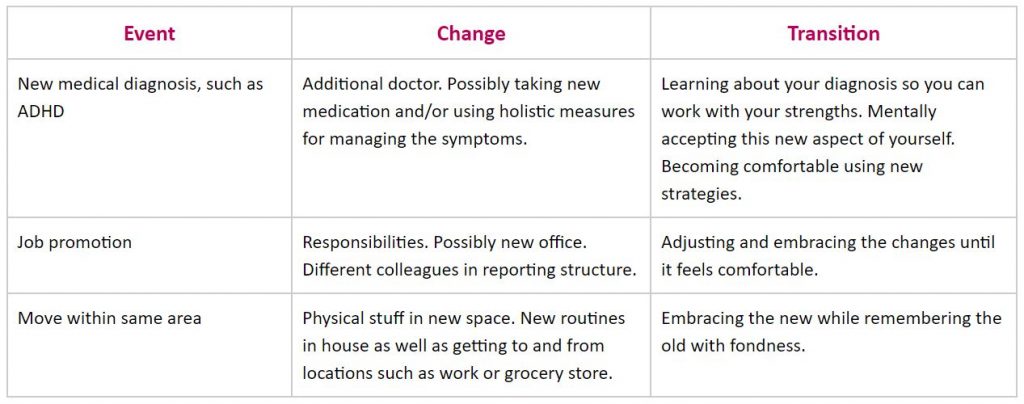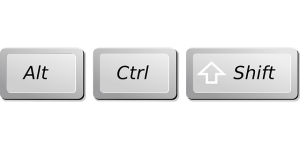
3 Actions to Take During Life Changes (& Transitions)
How comfortable are you with change? If a 1 means you do everything possible to avoid change, and 10 means you absolutely love change, what’s your number?
For many years, I was a 2-3 on this scale. I’m a planner. I like to be in control. Change, by its very definition, means at least some uncertainty. Change often involves some risk. I’m not a risk-taker. On the tree of life, I’m the trunk-hugger, not the person out on the limb.
I have gotten better with change just because…life is full of adjustments of one type or another. And I can’t control everything!
You’re probably wondering, “What’s the point?”
Simply this: we all go through life transitions. We have no choice because our life isn’t going to remain the same forever. Where we do have choices is how we will react and adjust.
Over the past few years, I’ve had multiple life transitions in my personal and professional life. I’ve learned a LOT of lessons. And I’m confident that what I’ve learned will help you with future life transitions. Here are three lessons I’d like to share.
SEPARATE the change from the transition. Change is the situation itself. The focus is on the outcome of a shift in person, place, or thing. Transition is the emotional adjustment to your new reality. The focus is on the ending of the previous and shifting your state of being. If that sounds “sciencey,” let me give you a few examples:

ADDRESS the shift. This is the planning and organization piece. Don’t let those words scare you! If they aren’t your strength, there are people or companies that can help.
Oh, and we’re not just talking about physical space. You’ll have to adapt how you organize your time and the way you complete routine tasks.
 If you’re moving (new home or office), this is the strategy and personnel needed for packing and unpacking. If you’re moving to a new home, this may also include interior designer, maintenance people, realtor, and a slew of other people. Most likely you’ll adjust the routes you take to get to stores, home, office, etc. If traffic flow is different, then you’ll change the amount of time to drive to these locations.
If you’re moving (new home or office), this is the strategy and personnel needed for packing and unpacking. If you’re moving to a new home, this may also include interior designer, maintenance people, realtor, and a slew of other people. Most likely you’ll adjust the routes you take to get to stores, home, office, etc. If traffic flow is different, then you’ll change the amount of time to drive to these locations.
A life status change (marriage, birth, divorce, death, etc.) transforms how you process information (such as bills). Not to mention your physical space, routines, and schedule.
INVOLVE others. “Others” may include vendors (plumber, landscaper, etc.), support personnel (doctor, coach, therapist, etc.), or others directly impacted by the change.
With a job promotion, you pass your current responsibilities, information, and possibly your office, to whoever is assuming your job. Simultaneously, you are learning new responsibilities, meeting new colleagues, moving to a new office, etc. This takes coordination of effort between several different people.
Planning to provide a home for your aging parent(s)? Even if you already have an apartment in the basement or a bedroom-bathroom suite available in your home, you’ll need a professional to help with aging-in-place accommodations such as safety bars in the bathroom. What about adjustments to responsibilities on both sides of the equation? There shouldn’t be an automatic assumption that the grandparent(s) take care of the grandchildren in all situations when childcare is required. Expectations should be discussed in advance.
Case study. Years ago, when I left teaching for the corporate ![]() world, I packed up teaching supplies that belonged to me and moved them to my house. In my new job, I set up my office, studied necessary information, met a completely new group of people, learned new skills, drove to a new location, etc. While some of these changes were uncomfortable, since I’d planned this job change, they didn’t come as a surprise.
world, I packed up teaching supplies that belonged to me and moved them to my house. In my new job, I set up my office, studied necessary information, met a completely new group of people, learned new skills, drove to a new location, etc. While some of these changes were uncomfortable, since I’d planned this job change, they didn’t come as a surprise.
The transitions were a little trickier. I was used to eating lunch with colleagues in the teacher’s lounge. The first few days at my new job, I ate my lunch in the break-room…alone. In my mind, I’d been planning to meet new colleagues and do a little bonding over lunch. While I knew it wouldn’t be as “regulated” as lunchtime at school, I still figured I’d interact with some people. I found out that no one eats in the break-room. People ate in their own offices or with others at scheduled business lunches off-campus. That took lots of getting used to!
Since I was in a completely different field, I knew I’d be learning lots of new things. What I didn’t expect was the complete overwhelm that came with that. Moving from the education world of Apple computers to the corporate world of PC’s left me in the dust the very first day. A colleague showed me the basic structure of files and I got lost immediately. I was thinking, “what have I done?” And that was before I was introduced to the actual subject matter! A few weeks (or maybe months!) later, when I’d learn a little bit of the lingo and just a tiny bit about the “widgets” we sold, I was in a meeting. At one point, the person conducting the meeting said, “Janice, just to give a little overview since you’re new…” and he proceeded to his overview. What he didn’t realize was that I didn’t even understand enough to follow anything beyond his first couple of sentences.
I made the change of new work location, people, and even lunch by myself. It was months before I understood enough of the technical stuff to not feel completely overwhelmed in meetings. It took even longer before I felt that I understood and could contribute in a way that was productive.
In the end, the new career taught me many things that I’ve used in each career since. But in the early days, I wasn’t sure I was going to make it through the first week! In fact, there was a part of me ready to go back to teaching!
Do you struggle with life transitions? Sign up for our monthly e-news The Life Transitions Organizing Bulletin (at the bottom-left of this page) for more information about how to successfully navigate life transitions.



